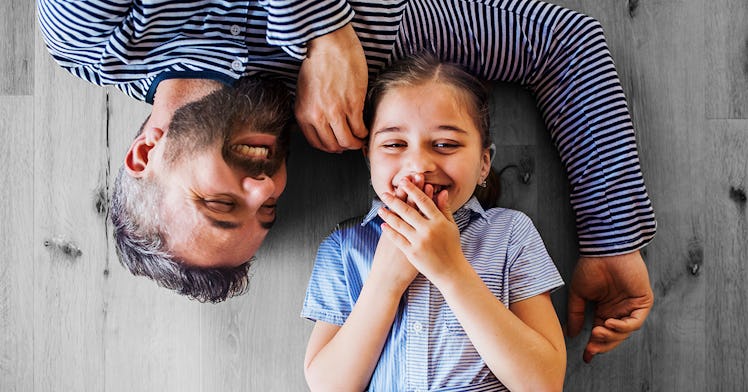Teach Your Kid to Laugh at Life, Which is Dumb
Children with a sense of humor have a massive and measurable advantage in life.

A kid that can’t laugh at the world operates at a disadvantage. Not only are the health benefits of laughter well documented, the social benefits are wide ranging. Jokes are a shortcut to bonding, to finding a more attractive partner, to stress relief, and to coping with shitty situations. A sense of humor makes the human condition more tenable. Still, there’s no trick for raising a funny kid or, barring that, a kid that recognizes when other kids are being funny. Passing down humor is really about creating the conditions for humor. That’s not necessarily hard, but it does require some conscious effort.
“I’m personally convinced that any child who sees a sense of humor in action as they’re growing up has a step ahead,” explains Dr. Paul McGhee author of the child’s guide to humor Stumble Bees & Pelephones: How to Develop a Powerful Verbal Sense of Humor. “From my point of view what humor really is is a form of play. It’s mental play, intellectual play, playing with ideas.”
While most animals appear to have developed some form of play in early life, their play is largely physical. Humans play in similar ways, wrestling and chasing. However, we also have additional cognitive resources that require sharpening. Humor, McGhee explains, is the play that allows humans to test the boundaries of language and ideas. And just an exploratory physical play can sometimes lead to destruction, humor is about breakage. It is a form of rebellion against norms that requires an understanding of norms. That’s why even a kid with the most serious parents is likely to point to her bottom when dad asks her to point to her ear.
“It’s built into us to get pleasure out of screwing things up once we understand them,” says McGhee. “Humor comes in the form of doing things that are known by the child to be silly, backward, wrong or incongruous.”
Weirdly, parents seem to abandon the encouragement of humor after babyhood. Where once they made fart noises in an attempt to get their kid to lose their mind with laughter, they start to get annoyed after hearing the same unfunny knock-knock joke for the fifth time in a row. Instead, parents tend to laugh at their children’s cute confusion in the world. There’s nothing wrong with that, but intentional humor deserves more praise because it requires children to learn multiple meanings of a word, identify the ones that fall outside social patterns, and subvert understood narrative structures. Do kids jokes suck? Generally, yes, but they are an achievement, which is as good a reason as any to laugh.
“The family that plays together stays together,” says McGhee. “There’s a bonding that happens through that humor. It does make you feel closer when you’re laughing together.”
Enter the “Dad Joke,” a much-maligned (and justifiably so) genre of humor. Puns work because they represent the easiest form of humor to “get.” They are super helpful for children who are developing an understanding that by flipping phonemes or word meanings a sentence can defy expectations. And while practicing puns with kids is an excellent way to help them develop more sophisticated understands of both humor and language, parents can also help their kid out by being more aware of what they find funny.
“Spend a week or two just thinking about your own sense of humor,” Dr. McGhee says. “What are the things that you now laugh at?”
Whatever the answer to that question is, optimize for that. Develop a habit of putting yourself in the right mind frame to laugh. That’s particularly true when it comes to laughing at yourself McGhee says, adding, “Sometimes you’ll use the phrase, ‘Someday we’ll look back at this and laugh.’ Why wait?”